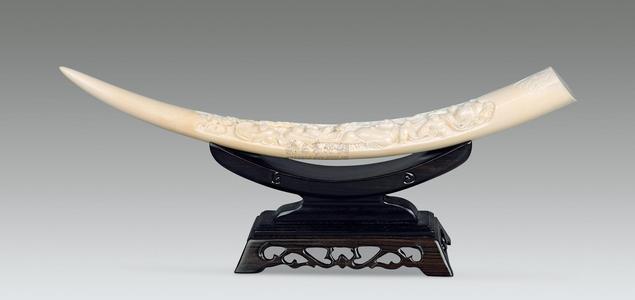We may be the last generation to see elephants in the wild. Because people still want ivory.
我们这一代可能是最后一代能见到野生大象的人了。因为人们仍想获取象牙。
Nearly two-thirds of all forest elephants have been killed for their tusks in the last decade, some 60 elephants per day. At least 30,000 elephants of all three remaining species have died each year in recent years. At that rate, wild elephants will be gone in just a few decades. All so their modified incisors can be used as a raw material for art in Asia or the bows of string instruments in Europe.
在过去的十年里,大约有三分之二的丛林象因被夺去象牙而惨遭猎杀,被猎杀的数量平均每天约为60头。近年来,在现存大象的三个品种中,每年至少有30,000头象死亡 。照此死亡速率来算,野生大象将会在短短几十年的时间里灭绝。这样一来,加工过的象牙可被当做亚洲艺术的原材料或欧洲弦乐器里的饰片。

In fact, the continued demand, along with the dwindling numbers of elephants, have pushed up prices for ivory. The resulting sales of tusks feed terrorist groups, not the poor. These extremist poachers employ machine guns, night-vision goggles and even helicopters.
事实上,人们对象牙的不断需求,以及大象数量的不断减少已造成了象牙价格攀升的局面。象牙销售后,获利的是恐怖组织,而非穷人。这些极端猎杀者使用机关枪、夜视镜、甚至直升飞机来猎杀大象。
Only one action can save the world’s wild elephants, according to Elizabeth Bennett, Vice President for Species Conservation at the Wildlife Conservation Society: close all ivory markets. Her analysis is in the journal Conservation Biology. [Elizabeth L. Bennett, Legal Ivory Trade in a Corrupt World and its Impact on African Elephant Populations]
据野生动物保护协会物种保护部门副主席伊丽莎白·贝内特称,拯救世界野生大象只有一个方法:关闭所有象牙市场。其分析报告在生物保护学期刊中有记载。[伊丽莎白·L·贝内特,论腐败世界中的合法象牙交易及其对非洲大象数量的影响]
International trade in fresh ivory is already banned. But legal markets persist in Asia, fed by confiscated ivory stockpiles and antiques. Inevitably, those markets serve to launder poached ivory and drive demand. Therefore, all ivory markets must be closed. Otherwise we may be living through the end times for elephants.
国际贸易早已禁止交易新鲜象牙,但亚洲合法市场仍在进行,该市场充斥着没收的象牙存货及其古董和收藏品。不可避免的是,这些市场也为走私偷猎象牙及刺激需求提供便利。因此,所有的象牙市场必须关闭。否则,在我们有生之年中,我们将目睹大象的灭绝。












